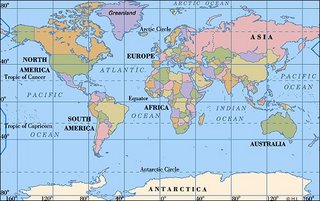2.01.2007
World Space Agency Wanted
 Over at the globalization summit, and no, I don't mean that little shindig in Davos, I mean the Jan. 18th gathering of world space law gurus for the "Space Law in the Era of Globalization" roundtable, hosted by the National Center for Remote Sensing, Air and Space Law, one item on the table was the issue of whether the nations of Earth need to create an international space law regulatory body. Many experts think such an entity is indeed inevitable.
Over at the globalization summit, and no, I don't mean that little shindig in Davos, I mean the Jan. 18th gathering of world space law gurus for the "Space Law in the Era of Globalization" roundtable, hosted by the National Center for Remote Sensing, Air and Space Law, one item on the table was the issue of whether the nations of Earth need to create an international space law regulatory body. Many experts think such an entity is indeed inevitable.(Well? I say, what's wrong with it? More jobs for space lawyers!)
Lots of other issues came up, too. As promised, moderator Prof. Joanne Irene Gabrynowicz's crew has graciously put together a video recording of the roundtable: morning and afternoon sessions. (This is a powerpoint for you powerpoint fans.)
And here's a brief recap of the roundtable, posted by the university.
OXFORD, Miss. -- Though current space law policy does not support the establishment of a world space agency or similar organization, some international space law experts meeting today (Thursday) at the University of Mississippi say it's just a matter of time before such an agency becomes a reality.
"I don't think the world has any choice," said Ram Jakhu, associate professor with the Institute of Air and Space Law at McGill University Law School in Montreal, Canada.
Jakhu explained that an organization will be needed to examine and mediate issues, such as public safety related to the regulation of weapons in space, as well as an expected increase in space law litigation caused by the growing number of private companies wanting to establish a presence in outer space.
An international space law regulatory body was one of many topics addressed during the round-table discussion at the university's Lamar Law Center. The daylong event was sponsored by UM's National Center for Remote Sensing, Air and Space Law and focused on "Space Law in The Era of Globalization."
The nearly two dozen space law leaders and policymakers, who journeyed to Oxford from across the globe, do not wholly agree on the function and management that such an international regulatory body would have. However, there was some consensus that necessity will dictate its establishment to deal with the many different space laws that have been created.
Stephen Doyle, honorary director of the International Institute of Space Law, said a number of models could be used to create such an agency, including the Universal Postal Union, which coordinates mail among countries, and the International Civil Aviation Organization, a United Nations agency that deals with aviation law.
Despite seeing the need for a body to oversee space law, most of the panel members agreed that current space law does work to some extent. However, Sergio Marchsio, a member of the U.N. Committee on the Peaceful Uses of Outer Space, said there is room for improvement for a number of reasons: The law lacks universality, the institutions that deal with space law are at times old fashioned and there is no clear mechanism to settle disputes surrounding globalization and the integration of the private sector into space law.
The round-table discussion, which was webcast live on the center's Web site, also included discussions on the efficacy of the current treaty regime, the U.S. national space policy, newly emerging space-faring nations, legal aspects of the Space Exploration Initiative, space tourism, peaceful uses of outer space and policies governing access to earth observation data.
And there is little doubt that the meeting of space law minds will result in new areas of study and activity in space law, said Joanne Irene Gabrynowicz, director of the UM center.
"These people are either the decision makers or the opinion leaders in their own countries," she said. "These are the people that their governments go to when they say 'How should we approach this question of usage of space?'"
Other participants in the event included representatives from the Polish Space Office & Centre for Science and Security at King's College in London, Mahidol University International College in Thailand, Office for Programme Matters in the European Space Agency, George Washington University Space Policy Institute, Space Law Practice Group, Brazilian Association of Air and Space Law, U.S. Office of International Aviation, University of Leiden in the Netherlands and City University of Hong Kong.
Also attending were two former general counsels for NASA, a former commissioner on the Arizona Space Commission and representatives from several U.S. law firms dealing with space law issues.
* * *
(Thanks, Joanne and everyone. ;)






